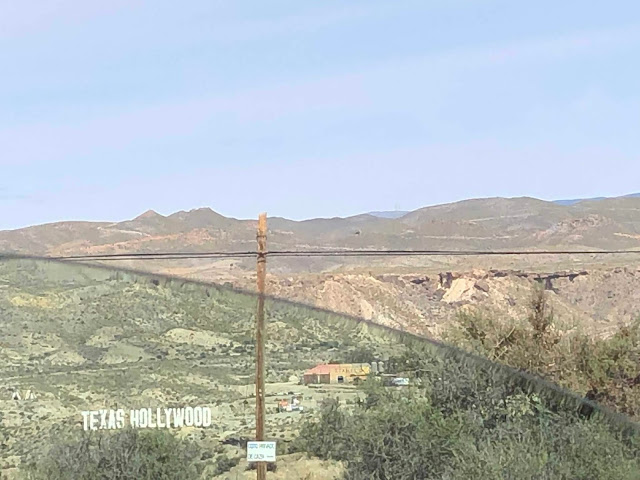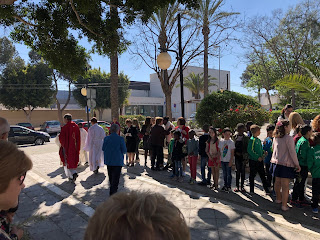Philippine and Failure
Happy Feast--just a few days late!
I preached this morning at our mid-day prayer service, using the Gospel reading of today, which is not one of my favorites. But it gave me an opportunity to talk about St. Philippine Duchesne, whose feast day was on Monday. Enjoy!
I preached this morning at our mid-day prayer service, using the Gospel reading of today, which is not one of my favorites. But it gave me an opportunity to talk about St. Philippine Duchesne, whose feast day was on Monday. Enjoy!
Gospel: Luke 19:11-28
While
people were listening to Jesus speak,
he proceeded to tell a parable because he was near Jerusalem
and they thought that the Kingdom of God
would appear there immediately.
So he said,
“A nobleman went off to a distant country
to obtain the kingship for himself and then to return.
He called ten of his servants and gave them ten gold coins
and told them, ‘Engage in trade with these until I return.’
His fellow citizens, however, despised him
and sent a delegation after him to announce,
‘We do not want this man to be our king.’
But when he returned after obtaining the kingship,
he had the servants called, to whom he had given the money,
to learn what they had gained by trading.
The first came forward and said,
‘Sir, your gold coin has earned ten additional ones.’
He replied, ‘Well done, good servant!
You have been faithful in this very small matter;
take charge of ten cities.’
Then the second came and reported,
‘Your gold coin, sir, has earned five more.’
And to this servant too he said,
‘You, take charge of five cities.’
Then the other servant came and said,
‘Sir, here is your gold coin;
I kept it stored away in a handkerchief,
for I was afraid of you, because you are a demanding man;
you take up what you did not lay down
and you harvest what you did not plant.’
He said to him,
‘With your own words I shall condemn you,
you wicked servant.
You knew I was a demanding man,
taking up what I did not lay down
and harvesting what I did not plant;
why did you not put my money in a bank?
Then on my return I would have collected it with interest.’
And to those standing by he said,
‘Take the gold coin from him
and give it to the servant who has ten.’
But they said to him,
‘Sir, he has ten gold coins.’
He replied, ‘I tell you,
to everyone who has, more will be given,
but from the one who has not,
even what he has will be taken away.
Now as for those enemies of mine who did not want me as their king,
bring them here and slay them before me.’”
After he had said this,
he proceeded on his journey up to Jerusalem.
he proceeded to tell a parable because he was near Jerusalem
and they thought that the Kingdom of God
would appear there immediately.
So he said,
“A nobleman went off to a distant country
to obtain the kingship for himself and then to return.
He called ten of his servants and gave them ten gold coins
and told them, ‘Engage in trade with these until I return.’
His fellow citizens, however, despised him
and sent a delegation after him to announce,
‘We do not want this man to be our king.’
But when he returned after obtaining the kingship,
he had the servants called, to whom he had given the money,
to learn what they had gained by trading.
The first came forward and said,
‘Sir, your gold coin has earned ten additional ones.’
He replied, ‘Well done, good servant!
You have been faithful in this very small matter;
take charge of ten cities.’
Then the second came and reported,
‘Your gold coin, sir, has earned five more.’
And to this servant too he said,
‘You, take charge of five cities.’
Then the other servant came and said,
‘Sir, here is your gold coin;
I kept it stored away in a handkerchief,
for I was afraid of you, because you are a demanding man;
you take up what you did not lay down
and you harvest what you did not plant.’
He said to him,
‘With your own words I shall condemn you,
you wicked servant.
You knew I was a demanding man,
taking up what I did not lay down
and harvesting what I did not plant;
why did you not put my money in a bank?
Then on my return I would have collected it with interest.’
And to those standing by he said,
‘Take the gold coin from him
and give it to the servant who has ten.’
But they said to him,
‘Sir, he has ten gold coins.’
He replied, ‘I tell you,
to everyone who has, more will be given,
but from the one who has not,
even what he has will be taken away.
Now as for those enemies of mine who did not want me as their king,
bring them here and slay them before me.’”
After he had said this,
he proceeded on his journey up to Jerusalem.
Today’s Preaching:
I
have always been uncomfortable with this parable. There is not a single character in it whom I
want to emulate: the unjust master who
seeks kingship and riches, the two servants who bow to his desire for what is
not his, and the final servant who is called “wicked” simply because he lives
in fear and is not able to use what he’s been given. I can’t really relate to any of them. Well, maybe that’s not true. I can understand the final servant, in his sadness
and fear, and I think that above all is why I am uncomfortable with this
story. It just seems so unfair, that the
harsh reality of the world is thrown back on him when he fails to live up to the
expectations of a greedy master.
We
all can relate to the feeling of fear and its effect on our ability to live
each day to the fullest. We may fear
physical or emotional pain. We may fear
the loss of a friendship, or the angry reaction of someone we love. I can remember with shame and sadness pouring
my heart out to a friend, only to have him sever the relationship
completely. Maybe that fear is of
failure, as it seems in this story. We
fear to use our talents, our gifts, because they (and therefore we) might not
be appreciated. Even worse, our best efforts
might be ridiculed or belittled despite everything we do. We’ve all experienced
that feeling of humiliation, and no one wants to experience that again. It seems safer to build walls and to stay
where it is safe, where we do not feel so vulnerable.
Yet,
we are called to use our gifts and talents, not to protect them from the scrutiny
of the outside world. In fact, as the
parable tells us, the more we are given, the more that is expected of us. As teachers and preachers, growing in
Christian knowledge and faith, we become more aware of our responsibility and
call to share what we have known and what we believe with others. We grow and are stretched by approaching the
edges of our comfort, by opening our lives and our faith to the influence of
other thoughts and belief systems, and by allowing those others to change
us. That space of growth and openness is
terribly vulnerable, as is sharing our deepest beliefs with others. Whether it’s in opening our lives to someone
we care about, or in following where we see God calling us at our deepest
being, our vulnerability is where we most become who we are meant to be, where
we can most make a difference in the world around us. Being in that place is putting our safety and
security at risk, opening up to the possibility of rejection and acting despite
our fears. Yet, when we do that, we can
feel the transforming power of the Spirit molding us.
When
we talk of acting beyond fear and vulnerability, I can’t help but think of the
life of St. Philippine Duchesne, whose feast day we celebrated on Monday. Philippine was an early member of the Society
of the Sacred Heart, who brought the mission of the Society to the United
States from France. She first came to St.
Charles and established a school for girls in 1818, and she died and was buried
there many years later. Philippine’s
life is marked by the risks involved in using her gifts and following her call,
and by her own sense of failure in doing just that. She felt the call to religious life and became
a Visitation novice just before the beginning of the French Revolution, which
put an end to her religious life for a time.
After moving back home, she risked her neck (literally) to minister to
the priests and nuns who were being held awaiting execution in her own precious
convent which had been seized and turned into a prison.
Eventually,
Philippine met St. Madeleine Sophie Barat, the foundress of the Society of the
Sacred Heart, and became an RSCJ. In her
lifetime she opened numerous schools and convents throughout the United States. Her life-long dream of serving the Native
Americans was realized when she was in her 70s.
Philippine did amazing things, but she believed throughout her life that
she was a failure. Her attempt to
re-establish the Visitation monastery in her hometown of Grenoble ended when
the sisters walked out on her, unable to face the harsh post-Revolutionary conditions. She never learned English to her satisfaction,
and she did not learn the language of the Potawatami Indians. She had great difficulties in administering
the religious sisters under her care, repeatedly asking to be removed from the
position of superior.
While
we remember her as a humble woman of deep prayer, her self-perception was as a
failure. What inspires me in her life is
her ability to move forward with her calling and her dreams, after many years
of patient waiting, and while she believed herself to have failed at all she
did. The reality of failed attempts at
one thing or another did not cause her to live in fear of further failure.
I
can hold Philippine as a model when I feel like the third servant who hides
what he has been given in order to protect it from being taken from him. She helps me to see that perseverance pays
off, and that failing is not the end of the story. Without risk, we are unlikely to fail—but
without risk we cannot fully use the gifts God has given us.




Comments